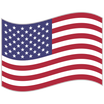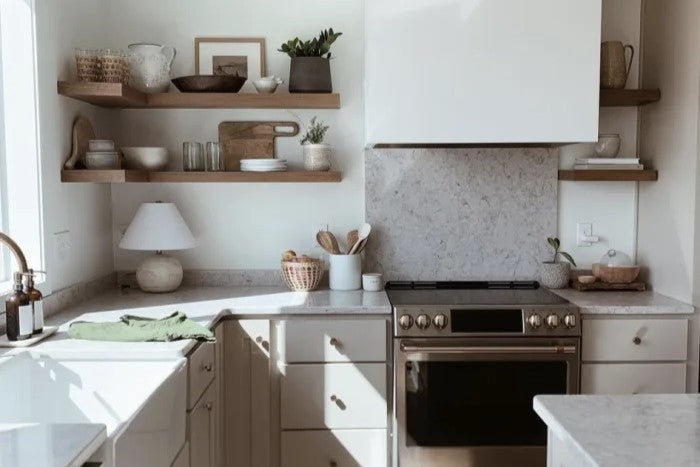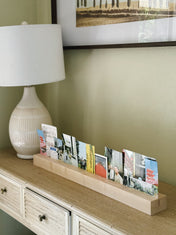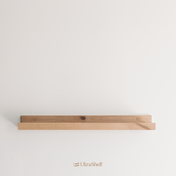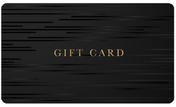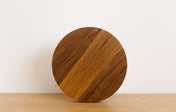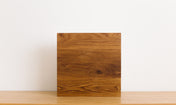Whether you’re sprucing up the dining room, adding storage to your laundry room, or adding a little decor to the bedroom, it’s important to know just how much weight your floating shelf can hold. Floating shelves are a great way to personalize your home decor and give functional storage a facelift, but you can’t just put anything on the shelves.
What Will Your Floating Shelf Hold?
The floating shelf weight limit depends on a few different things. It depends on how you hang the shelf and it depends on what the shelf itself is made of. Our custom floating shelves use a bracket system to hang on the wall. To hang your shelves you first attach your bracket to the wall, and then you slide your shelves onto the bracket.
When possible, you want to attach your bracket to as many wall studs as possible. Depending on the length of your shelf, you may only be able to attach to one stud — that is okay. The longer the shelf though, the more studs we recommend attaching to.
For every stud your bracket is attached to, your floating shelf can hold 50lbs. That means if you’ve got a three-foot shelf attached to two studs, your shelf can safely hold 100 lbs. If you’ve got a two-foot shelf attached to two studs, the same goes — it can hold 100 lbs. Regardless of the shelf length, material, or depth, each wall stud that your shelf bracket is attached to allows your shelf to hold 50 lbs.

Choosing the Right Brackets and Material
If you want your shelf to reach full floating shelf weight capacity, your custom floating shelves need a custom floating shelf bracket. Our innovative bracket system makes it easy to hang shelves on your wall, but it’s not a one-size-fits-all bracket.
You want your bracket rods to be at least half the depth of your shelf. This ensures that your shelf has the support that it needs to hold anything and everything that you want to place on it. With Ultrashelf, the shelf material doesn’t matter when it comes to shelf weight capacity, it’s all about the bracket. We offer three different bracket types for different shelf thicknesses. Regardless of the bracket type, your shelf weight capacity is still 50lbs per stud that the bracket is attached to.
How to Find Wall Studs

Finding studs isn’t as hard as it sounds. Typically, studs are placed 16 inches apart, but that number can change a lot based on how old your home is or building codes in your area. Older homes can have studs as far apart as 24 inches. If you have the blueprints for your home, you may be able to see how far apart your studs are, but if you don’t, finding studs is a game of trial and error. But before you go putting nail holes all along your wall to find the studs, there are a few stud-finding tricks to know.
If you don’t know where to start looking for a stud, start at your switches, outlets, or electrical box because these things are usually attached to a stud. You can also start at a corner and measure 16 inches into the wall, it’s likely that you’ll find a stud there.
The “knock test” is a test that contractors and interior designers have been using for years. I learned it from my grandpa. You knock on the wall with your ear against it to see if you can tell the difference between knocking on the wall over drywall or over a stud. When you knock and it’s just drywall, the knock will have an echo and sound hollow. When you knock and the sound has no echo and is more solid, you’re knocking over a stud.
Mark studs on your wall as you find them. We like to use sewing push pins or painters tape to indicate the studs. Once you’ve found one or two, you can simply measure between studs to find more.
You can also purchase a stud finder at a hardware store for under $30. If you plan on hanging lots of shelves in lots of different houses, it may be worth the investment. What’s not worth the investment though? Stud Finding apps on your phone. These apps are almost always useless.
Skipping the Studs

Sometimes you run into a situation where you can’t use studs, but skipping the studs can cause a problem. All of our shelves are made of real wood. Both the shelves and the bracket system are heavy. Without placing your shelves into studs, you’ll need to use drywall anchors. Drywall anchors can be found at any hardware store and are made to help disperse weight. This protects your wall from tearing and keeps your shelving secure. If you do use drywall anchors instead of studs, we do not recommend putting more than twenty pounds of weight on the shelves.
We also do not recommend hanging your shelves without using the wall studs or drywall anchors. This could cause damage to your walls.
Floating Shelf Depth
The depth of your floating shelves is also important because if you’re asking the shelf to hold up heavy objects, a little added depth can go a long way. Added depth can work to disperse the weight across the shelf and gives your heavy objects more room. Ultrashelf floating shelf brackets only hold shelves up to 12 inches deep. If you have a large object that needs more shelf room than that, it may need to find a new home on a nightstand or a dresser, or you may want to consider using additional supports.
Additional supports can be added to shelves deeper than 12 inches to protect the shelf, the wall, and everything on the shelf. These supports or brackets can be purchased at a hardware store or on Etsy. Install the shelf using the bracket system and then add the supports after the installation. You will likely need a few power tools to knock this project out.
Heavy Decor

Sometimes you don’t realize just how heavy your shelf decor is until it’s too late. Though most shelf decor is light enough that your shelf will never have a problem, there are a few sneaky situations where the weight piles on faster than you’d think.
One of the biggest shelf decor culprits when it comes to decor that weighs a lot is books. If you’ve ever been tasked with carrying the moving box full of books, you know that all of that paper can really start to weigh a lot. If you have a shelf that is only attached to one stud, you need to make sure that your stacks of Shakespeare aren’t tipping the scales over 50 lbs. Book weight really does add up a lot faster than you’d think, so if you’ll be using your floating shelves for bookshelves, consider weighing before displaying.
The laundry room is another area where we see shelf decor get heavy, fast. Putting your laundry detergent into glass apothecary jars? We are all for it. Storing 55 lbs of laundry detergent in glass apothecary jars? Only if you’re attached to more than one wall stud. Laundry detergent and other laundry care items can get heavy fast. If you want your shelf to be functional storage, you need to make sure that your brackets are correctly secured in the wall.
The same goes for a kitchen where you store baking goods like flour and sugar. These bulk items sometimes come in 50lb bags to start with, so make sure that if your shelf needs to hold all of Betty Crocker’s baking goods, you attach it to multiple wall studs. Custom kitchen floating shelves provide a unique open concept design that allows homeowners to improve the decor and functionality of available kitchen space.
Kitchen organization ideas:
Floating shelf weight capacity should also be taken into consideration for shelves that will be primarily used as storage. If your shelves will be holding boxes in the garage, food in the pantry, or weights in a home gym, make sure to remember that the shelves can only hold 50 lbs per stud. And make sure to remember your shelf’s weight capacity when throwing an extra box up there sounds like the easy solution a few years down the road. If you’ve already hit your floating shelf weight limit, don’t keep adding things to the shelf or you may end up damaging your wall.
Need help picking out the perfect floating shelves? We’re here to help. Our team of experts can help you pick out the perfect custom shelf for any room in your house.

